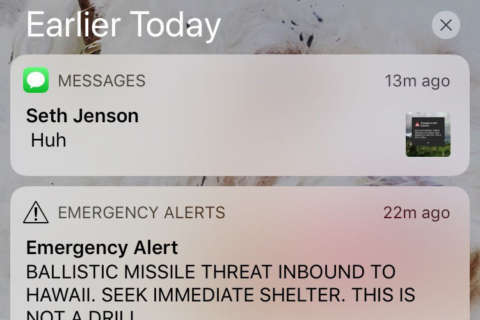WASHINGTON — While not quite a date that will live in infamy, Jan. 13 is likely a date that people on Hawaii won’t forget anytime soon.
Just after 8 a.m., a message sent statewide read “BALLISTIC MISSILE THREAT INBOUND TO HAWAII. SEEK IMMEDIATE SHELTER. THIS IS NOT A DRILL.” For the next 40 minutes, people waited. Then came the second message: false alarm.
“What happened was an accident,” said J.J. Green, WTOP’s National Security Correspondent. “It was accidental and it is something they are looking very clearly and seriously at, on how to prevent it from happening again.”
Hawaii’s emergency management agency has already claimed responsibility, saying someone simply pushed the wrong button.
The backlash from politicians was swift.
There is no missile threat. It was a false alarm based on a human error. There is nothing more important to Hawai‘i than professionalizing and fool-proofing this process.
— Brian Schatz (@brianschatz) January 13, 2018
“What happened today [Saturday] is totally inexcusable,” Sen. Brian Schatz, who represents Hawaii in the U.S. Senate tweeted after the all-clear was given. “The whole state was terrified. There needs to be tough and quick accountability and a fixed process.”
While there is already a federal probe underway, some point out the fact this one incident highlights a much more serious problem.
“This could have been a very, very disastrous mistake,” Green said. “Had some authority with some military organization recognized that ‘Oh, maybe there is a missile incoming from North Korea,’ then some decision [could have been] made to essentially retaliate. I mean, that would have taken a heck of a lot of work and there are fail safes and layers in place to prevent an accidental strike against another country. But again, what could happen is — in a situation like this — there could very well be the mistake of thinking this is real.”
There have been close calls before and some have even had deadly consequences, but most of those date back to the Cold War.
But as terrifying as those false alarms were, they were rarely made public.
“There are some serious conversations going on today at the nuclear deterrent level and at the state management level,” Green said. “This is a situation where authorities are going to have [to[ sit down and figure out ‘How are we going to deal with this, especially now that we’ve got this issue with North Korea going on.'”
The threat from North Korea and the escalating taunts about nuclear annihilation on both sides casts a shadow over Saturday’s false alarm.
“How is the U.S. going to prepare itself to deal with that and against the back drop of that?” Green asked. “How are we going to make sure that nobody makes a mistake like what happened [Saturday] that could lead to a greater disaster?”





